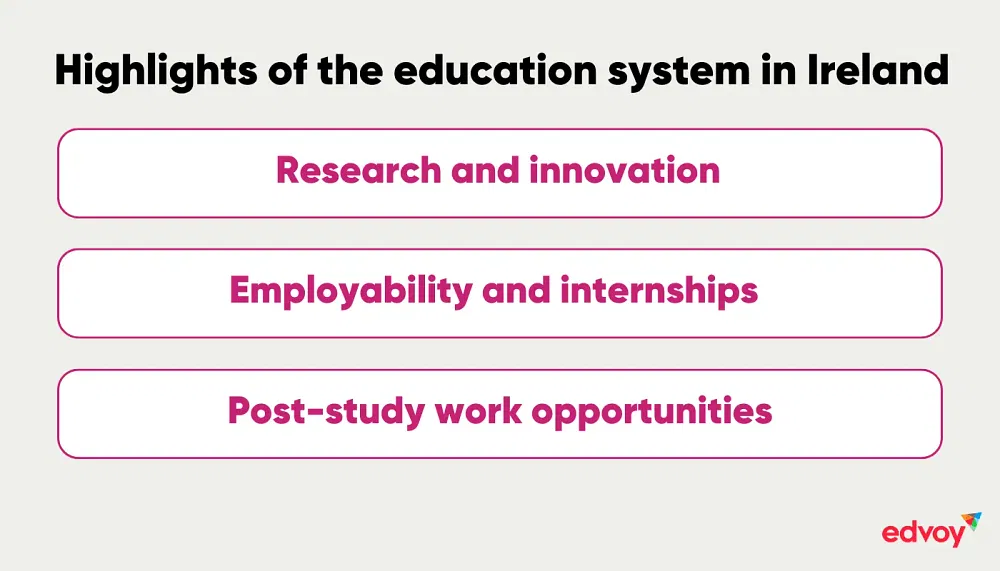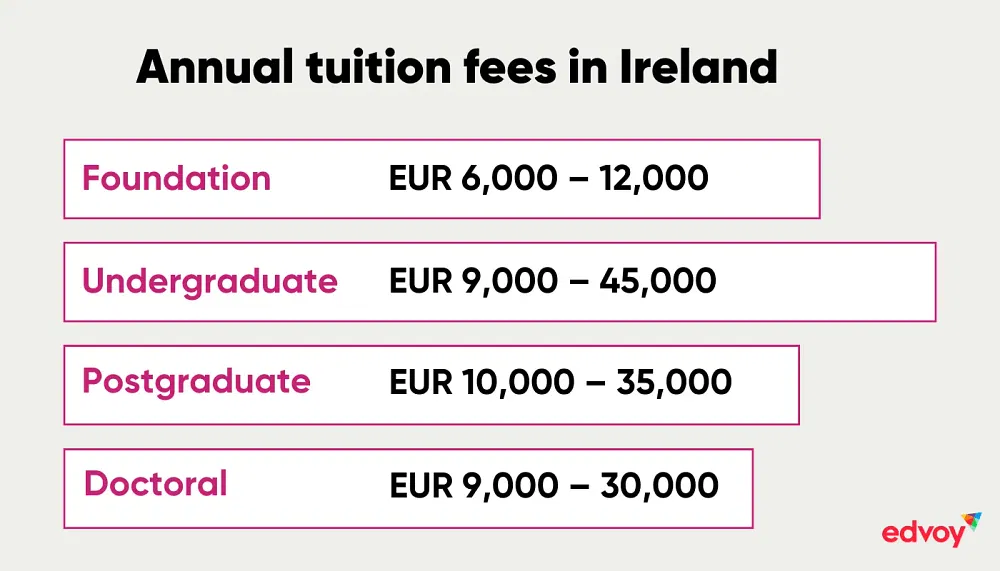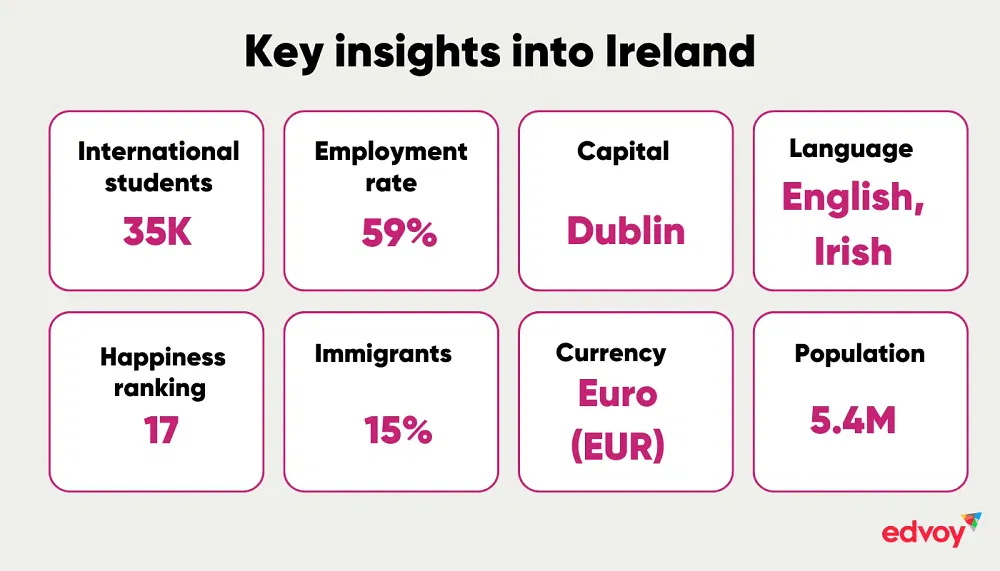Your study abroad dream needs action! Don’t miss the next intake—apply now!
Ireland is a lively and culturally vibrant country featuring scenic landscapes, welcoming people, and high-quality education. With well-ranked universities and research institutes, the country is one of the most preferred study destinations for international students like you. Take a look at a few key insights about Ireland.
Moving to a new country can bring about quite a lot of changes: geographically, culturally, and psychologically. So, if you're concerned about the education system in Ireland, it’s likely that you'll have concerns about various other aspects of life in the country. No worries. Our experts have sorted it out for you in the table below. Click on the topics you’re interested in and get the must-need information you’re looking for.
| Student life in Ireland | Student visa in Ireland |
| Employment opportunities in Ireland | Cost of living in Ireland |
| Best universities in Ireland | Best courses in Ireland |
The education system in Ireland is known for its focus on nurturing critical thinking, innovation, and practical skills in learners like you. Something that stands out in the Irish education system is the collaboration between academic institutions and industries. This helps you gain the real-world experience and practical skills needed to take your career to the next level. Here’s all you need to know about Ireland's educational structure, the courses, the cost of education and more. Read on.
The overview
Primary education is for children between the ages of 4 and 12, as they need to focus on learning foundational aspects. Secondary education is divided into two stages called Junior and Senior Cycles for students aged 12 to 18, and at the end of secondary education, they receive a Leaving Certificate, which serves as a gateway to higher education.
Higher education in Ireland is globally recognised. It comprises universities, institutes of technology, and colleges, offering a wide range of courses in undergraduate, postgraduate, and vocational categories. The country places significant focus on helping students above the age of 10 to develop a research mentality, innovative thinking, and practical skills.
The education system in Ireland is governed by several bodies. The formulation of policies and overall management of education at all levels falls under the Department of Education. The strategic development and funding of higher education institutions are managed by the Higher Education Authority (HEA). To maintain the quality of education, Quality and Qualifications Ireland (QQI) is responsible for setting benchmarks and accrediting programs. Moreover, agencies like SOLAS support further education and training in the vocational sector.
The highlights
The Irish education system places a strong focus on developing research skills, practical knowledge, and innovative thinking in students. You'll see this emphasis in fostering creativity and innovation in fields like technology, business, and healthcare in Ireland. Let’s dive deeper into the highlights of the Irish education system.
Research and innovation in Ireland
Something unique about Irish universities is their active collaboration with industries and the effort taken to foster cutting-edge advancements in fields like biotechnology, information technology, and renewable energy. In Ireland, you’re definitely going to have a lot of access to state-of-the-art research facilities and opportunities to work on projects with real-world impact.
Employability and internships in Ireland
Another key highlight of studying in Ireland is the focus on employability and practical learning. The academic programs in most universities incorporate internships and work placements, which will help you gain hands-on experience in your preferred field.
The booming industries in Ireland, especially in technology, finance, and pharmaceuticals, offer a wide range of internship opportunities. This undoubtedly strengthens your career prospects, and you will also gain valuable insight into the Irish job market.
Post-study work opportunities in Ireland
Ireland offers a Third-Level Graduate Scheme Visa that allows you to stay in the country for at least two years. Once you have a degree from an Irish university, you can use this visa to stay in the country and look for jobs.
With sectors like IT, pharmaceuticals, and finance that have attained fabulous growth in recent years, finding a job won’t be difficult. Ireland's growing job market, with the presence of global companies like Google, Facebook, and Pfizer, further strengthens your chances of securing a high-paying job. And, most importantly, a stable job in Ireland is your pathway to settling in the country.
The higher education landscape
Ireland’s great academic tradition dates back to the establishment of Trinity College Dublin in 1592. The country has made significant contributions to higher education, particularly in research, science, and the arts.
Today, Ireland has seven universities, numerous Institutes of Technology, and thousands of international learners from around the world. The higher education landscape in Ireland is categorised into undergraduate, postgraduate, and vocational programs.
Study levels in Ireland
The study levels in Ireland range from undergraduate to postgraduate and vocational programs. These study levels cater to the various academic needs you might have. The Irish education system ensures that the study levels equip you with globally recognised qualifications and skills for starting a successful career. Check out the table below to explore the details of each study level.
| Study levels | Duration | Description |
| Vocational | 1 - 6 years | Vocational training focuses on practical, career-focused education and is offered by Institutes of Technology and colleges. |
| Foundation | 6 months - 1 year | Foundation programs are preparatory courses to meet entry requirements for the university. |
| Undergraduate | 2 - 4 years | Undergraduate courses are entry-level higher education programs for those who have just finished school. |
| Postgraduate | 1 - 2 years | Postgraduate programs are advanced studies for those with an undergraduate degree. |
| Doctoral | 3 - 4 years | Doctoral programs are the highest level of academic study focused on original research. |
Undergraduate courses in Ireland
Ireland has various kinds of undergraduate programs such as Bachelor’s degrees, Higher National Diplomas (HNDs), Foundation degrees, and more. These programs let you earn recognised qualifications through industry-focused learning. Check out the table below for more insights.
| Types of undergraduate courses | Duration | Description |
| Higher Certificate | 2 years | The program equips you with practical skills and knowledge to make you ready for entry-level employment opportunities. |
| Ordinary Bachelor's Degree | 3 years | The program focuses on practical and technical skills and prepares you for various professions. |
| Honours Bachelor's Degree | 3 - 4 years | This program gives you an in-depth understanding of a particular discipline with both theoretical and practical knowledge. |
Postgraduate courses in Ireland
| Types of postgraduate courses | Duration | Description |
| Postgraduate Certificate | 6 months - 1 year | The program is all about developing distinct skills. It’s usually done for career advancement. |
| Postgraduate Diploma | 1 year | The program deals with advanced study in a particular field rather than serving certificates. It’s pursued to serve as a pathway to a master's program. |
| Research Master's Degree | 2 years | This program is ideal for aspiring researchers. It’s typically done before taking a PhD. |
| Doctoral Degree (PhD) | 3 - 4 years | The program lets you contribute a thesis with original knowledge to your field of study. |
Cost of education in Ireland
Getting an international education can be expensive and studying in Ireland is not any different. It’s great to have an understanding of the total costs like tuition, housing, daily living costs, and more to manage your finances well.
As with any country, tuition costs depend on the education level, the college, and the program selected: specialised diplomas and postgraduate degrees are usually more expensive.
Fortunately, Ireland offers a variety of funding opportunities and scholarships to minimise your burden of costs. To understand better, let’s examine the average tuition fees of various study levels.

Apart from your tuition fees, the cost of accommodation will take up a major chunk of your expenses. On average, it’ll cost you EUR 6000 to EUR 12,000 annually for on-campus housing, while equivalent private rent amounts to more.
Food costs depend a lot on your lifestyle, averaging EUR 250 to EUR 400 per month. If any, the utility bills can run from about EUR 100 to EUR 150 a month. Transport expenses vary, but your student travel cards help reduce the cost. Health insurance is mandatory and is from EUR 500 to EUR 1000 annually.
You can expect a few other expenses for hanging out with friends and leisure activities, perhaps EUR 200 to EUR 300 every month. So proper budgeting is the key to managing your finances well. Easily secure educational loans using the Funds feature in our Edvoy app.
Final thoughts
Ireland’s educational system combines academic excellence, innovation, and cultural diversity remarkably. With globally recognised universities, outstanding faculty, and a strong emphasis on research and development, Ireland stands out as a top choice for international students.
The country’s connections to the global workforce, its vibrant culture, and the high quality of student life make it an attractive location for higher education. From undergraduate to doctoral programs, Ireland offers a variety of opportunities across different fields of study making you ready for international success.
If you're seriously considering Ireland for your higher studies, we have a good number of partner universities in Ireland where you can apply for your preferred courses.
We’re a global technology-driven admissions platform offering study-abroad solutions to students across the world. Our AI-powered app simplifies the course search, application process, and enrollment in international universities. With 18+ years of experience, we’ve helped 85K+ students from over 25 countries to pursue their study-abroad dreams. You could be the next!
Let our counsellors clear all your concerns and help you realise your dream towards being an international student. Let's start your study-abroad journey right away!
Frequently asked questions
What is third-level education in Ireland?
In Ireland, the third-level education sector includes universities, institutes of technology, and colleges of education, and they are collectively referred to as higher education institutions (HEIs). In the National Framework of Qualifications (NFQ), the third-level qualifications correspond to Levels 6-10.
What is the best university in Ireland?
Ireland has some world-class universities, a few among them are Trinity College Dublin, University College Dublin, University College Cork and University of Limerick.
Which subject is the best to study in Ireland?
Data science, Big Data, Computer Science, Cyber Security, Cloud Computing, and Artificial Intelligence are a few of the in-demand courses preferred by international students in Ireland. These programs can easily help you land a high-income job.
